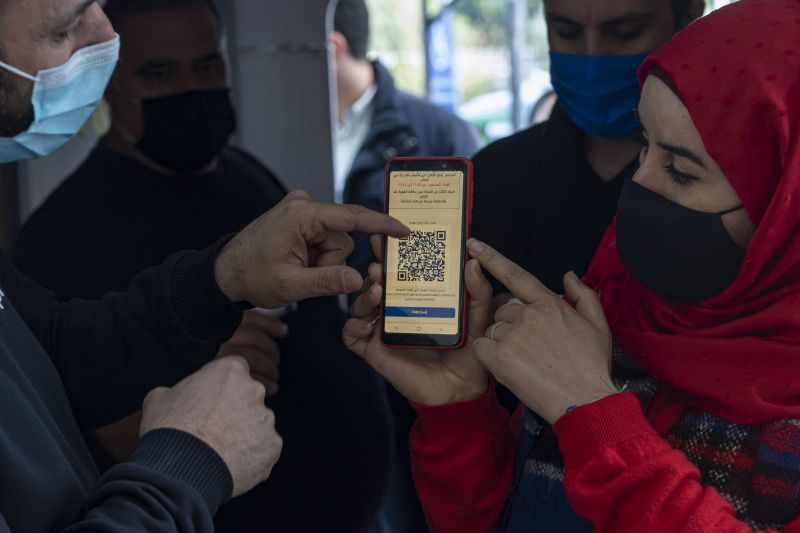
A shopper shows her QR code permit at the entrance to a supermarket. In-person grocery shopping is now allowed with such a permit under the first phase of reopening from the COVID-19 lockdown. (Credit: Nabil Ismail)
BEIRUT — The impact of the countrywide post-holiday lockdown may be starting to pay dividends as pressure on some hospitals declines — despite the Health Ministry registering 3,157 new cases of COVID-19 Wednesday.
While ICU occupancy remains near maximum levels, the number of coronavirus patients arriving at the emergency room at Jbeil’s Hôpital Notre Dame des Secours has dropped, medical director Ziad El Khoury told L’Orient Today.
“Our coronavirus ward and ICU are still full, but the number of patients coming to the ER has drastically decreased,” he said.
After resorting to treating patients on the hospital’s sidewalk last month, Khoury welcomed the abatement of the flood of patients.
“The drop has let us breathe a bit, but I hope that it persists,” he said.
At Haykel Hospital in Tripoli, infectious disease specialist Mona Youssef echoed Khoury’s experience.
“Despite the stability in daily cases, we are witnessing a decrease in patients entering the emergency room,” she said, adding that occupancy across the ward has declined.
Lebanon is entering a “post-crisis period,” Youssef said, but cautioned against the country letting its guard down as authorities start loosening restrictions.
With the first phase of the reopening plan underway this week, banks and supermarkets have started welcoming clients, setting the stage for another spike in infections if precautions aren’t taken seriously, she warned.
“Hopefully everyone will be careful to avoid the catastrophe of January,” she said.
But the heartache suffered by many families continued Wednesday with 66 more deaths reported by the Health Ministry, bringing the human toll to 3,803 since the pandemic reached Lebanon almost a year ago.
The PCR positivity rate remains high, however, hovering near 20 percent more than a month since the lockdown was put in place.
At Rafik Hariri University Hospital, which has been at the forefront of the pandemic, pressure has yet to abate.
“We still have some 20 patients in the emergency room receiving treatment,” said Hussein Kataya, the nursing supervisor. All other beds are occupied, he added.
With Lebanon set to receive its first batch of COVID-19 vaccines on Saturday, Firass Abiad, the general manager of RHUH, highlighted that “vaccine hesitancy remains strong.”
“In a recent survey, only 33 percent of responders above 65 years of age (high risk) want to get vaccinated,” while only 4.5 percent of the general population has registered to receive the vaccine over the past 10 days, Abiad tweeted.
Khoury, whose hospital was selected as one of 42 facilities across Lebanon to administer the vaccines, said that his facility is ready for the inoculation campaign.
“We have set up everything, from platform to personnel,” he said, adding that the hospital is waiting for instructions from the Health Ministry to decide how many vaccines to administer per day.
On Wednesday, Abiad tweeted a picture of his facility’s ultracold freezer, which is needed to store Pfizer’s vaccine at temperatures of 80 degrees below zero.
“The countdown is on. We will be ready on time!” he tweeted.